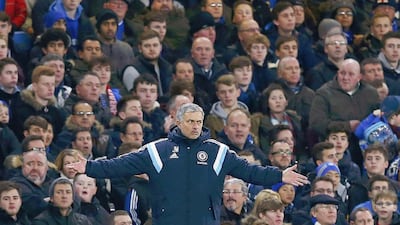There were two ways of looking at the news that Jose Mourinho had cancelled a news conference on Friday.
The ostensible reason – anger that Diego Costa’s apparent stamp on Emre Can had been highlighted on television – is patent nonsense, but the actual reason could be one of two things.
It may be that this is what Mourinho wants. For about a month, since Chelsea first began to stutter in away games, he has been scrabbling around for a way to generate a siege mentality.
He has moaned about Chelsea fans and he has cited a loose conspiracy against his team, apparently one that features an unholy alliance of journalists and opposing managers all talking about Chelsea as divers.
Now, at last, he has something more tangible.
Never mind that Diego Costa has been ducking red cards all season, that he clearly should have been sent off at Sunderland for kicking out at John O’Shea and then elbowing Wes Brown.
Never mind that the alleged stamp happened right in front of the Stamford Bridge media and the fourth official and could be seen by anybody.
Never mind that Costa has not yet been convicted, that process has taken its course and the incident is being investigated: Mourinho has his casus belli.
Never mind that his complaint undermines referees yet further in a season in which they are, en masse, perceived to be functioning poorly.
Never mind that he is bringing doubt upon the whole structure of English football, attacking the means by which decisions are made.
Never mind that these are the rules every club agreed to at the beginning of the season and have done for years.
Simply, Mourinho has seen the chance to prove that his side is fighting the world and he has taken it.
The other way of looking at it is that Mourinho is under intense pressure and spying conspiracy at every turn is not a deliberate act aimed at fostering team spirit but a manifestation of his paranoia.
The talk of conspiracy, for which he was fined after the draw at Southampton, seemed to focus on a strange cabal that featured Sam Allardyce and Steve Bruce, two managers who were once allies of Sir Alex Ferguson.
It is difficult to believe that Mourinho thinks that Ferguson, a manager he had gone out of his way to court, was pulling the strings behind the scenes.
There is a theory abroad – and it is only a theory – that Mourinho was badly damaged by what happened at Real Madrid when, in his final season, with the job of toppling Barcelona done, he found himself fighting a constant war against the media and half the dressing room.
It would be understandable if a man who had – with some justification – considered himself a master of media manipulation found his self-confidence shaken by the realisation there were forces he could not control.
In his first stint at Chelsea, Mourinho found the British media biddable; this time he has already found a cynicism.
Those initial cries of conspiracy after the Southampton game were largely ridiculed.
Cancelling the news conference has brought eye-rolling and accusations of petulance; given there is no opportunity for Mourinho to give quotes that might direct the news agenda, it also seems miscalculated, unless he thinks the criticism that is sure to takes its place will generate the siege mentality he desires.
The probability, though, is that Mourinho will emerge from this diminished, that the sense he is not quite the irresistible force he used to be will be reinforced.
After all, it is hard to imagine the Mourinho of a decade ago failing to capitalise on the failings of others as he did last season, or letting an eight-point lead slip as he did this.
Follow our sports coverage on Twitter @NatSportUAE

